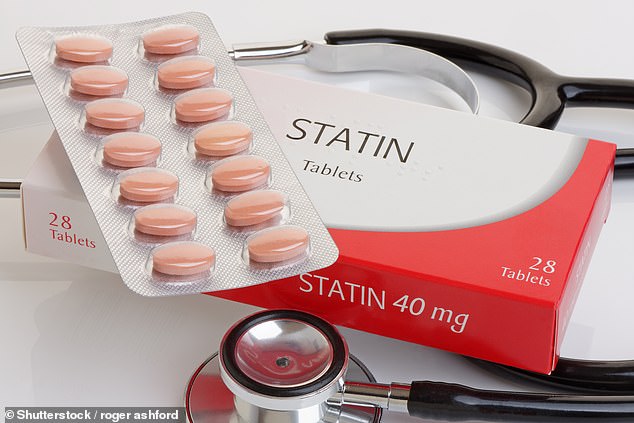DR. ELLIE CANNON: My back pain is so severe that I'm afraid it will prevent me from walking
I was diagnosed with spinal stenosis three years ago and am in constant pain. My painkillers are useless, but my doctors won't give me anything stronger. I even had injections in my spine, but they didn't help. I saw a neurosurgeon a few months ago, but I haven't heard anything since. My back is getting worse and I'm afraid that one day I won't be able to walk anymore. Can you advise me?
Spinal stenosis is a condition that causes back pain because the nerves are crushed by a narrowing of the spine.
It can be terribly disabling and difficult to manage. Pain clinics, general practitioners or a practice pharmacist should be able to offer options regarding the tablets you can take.
This often involves combining treatments and may include, for example, antidepressants, which can have a pain-relieving effect. Doctors try to avoid strong painkillers for a chronic pain condition because of the risk of addiction with long-term use or side effects such as falls in the elderly.

Today's reader asked Dr. ELLIE CANNON about spinal stenosis, a condition that causes back pain because the nerves are crushed by a narrowing of the spine.
But if someone's quality of life is reduced by pain, it's worth having a discussion in which the patient can weigh the risks and benefits of at least a stronger drug.
Tablets are not the only way to treat pain. In fact, if pain is a chronic problem, it may be wise to look at other options. Cognitive behavioral therapy can be beneficial and can help change the way you respond to pain.
Pilates and other low-impact exercises can also help because of the movements themselves and the endorphins released when exercising. Pain clinics may also recommend alternative measures for pain, such as acupuncture.
If a doctor promised treatment but didn't deliver, you have the right to go back and ask what happened. If the doctor is not available, the hospital's patient advice and liaison service can help.
Surgery may be an option, but setting realistic expectations is critical. Surgery can offer false hope of relief, so honest discussions are necessary.
I have a condition called immune thrombocytopenia, where my blood contains a low number of platelets. It started four years ago after what I thought was the flu, but now I think it was Covid. I have been in hospital three times in the past year. I had bad side effects from the injections I was prescribed, so I am now taking a medication called avatrombopag. Is there anything else I can do to increase the platelet count?
Thrombocytopenia describes a low number of platelets – the component of the blood that helps it to clot. Really low levels can lead to bruising and severe bleeding because the blood cannot clot when it needs to.
It happens when the immune system accidentally targets and breaks down platelets.
More from Dr. Ellie Cannon for The Mail on Sunday…
We don't know exactly why, but it is known to occur after a viral infection such as flu or Covid.
Platelet management can range from monitoring people with mildly low platelets to treatment by a hematologist in more severe cases. The aim is to increase the number of platelets in the blood and maintain normal levels – but this can be difficult to achieve on your own.
There are no known foods to increase platelet counts and you should avoid taking supplements as they may interfere with treatment or the condition.
Avatrombopag is a new drug for immune thrombocytopenia that increases platelet production.
Low platelets can be caused by other conditions, such as cancer, liver disease and pregnancy. Immune thrombocytopenia would be diagnosed by a hematologist after tests to rule out these things.
I've had four urinary tract infections (UTIs) in eight months. In both cases I was prescribed antibiotics and the symptoms disappeared, only to return after a few weeks. Later I was given topical HRT vaginally, which seemed to have helped, plus D-mannose tablets, cranberry tablets and oral probiotics. But I'm afraid the problem keeps coming back. What should I do?
Postmenopausal women can often experience urinary problems. Some specialists will recommend a trial of D-mannose or cranberry tablets, which may help prevent bladder infections, although the scientific evidence for this is not solid.
Otherwise, a nightly low-dose antibiotic is often used.
For a first infection, it is fine to prescribe antibiotics without testing.
If symptoms recur, laboratory testing is essential to find out which type of bacteria is causing the infection and to ensure that the correct antibiotic is offered.
If the same bacteria is picked up on subsequent tests, the infection may be chronic. Therefore, some women are advised to take a low dose of antibiotics every day in the long term. Other conditions can mimic an infection, so it is common for antibiotics to be incorrectly prescribed. The drop in estrogen levels during menopause affects the sexual organs and bladder systems, causing dehydration or a change in function, such as poor urinary control – which can be mistaken for a urinary tract infection.
A trial of topical HRT, an estrogen cream applied to the vaginal area, is the right option to treat these symptoms.
This replenishes the hormones only in this part of the body and improves the sensation of the bladder and urethra. If it works, a low dose of the treatment can be used long-term.
It is important for women to be aware that urinary symptoms after menopause can rarely be a sign of ovarian cancer and that a pelvic ultrasound may be needed to check the ovaries.
A boost for demand for vaccines
Last week I called for the rollout of a vaccination program to protect against respiratory syncytial virus (RSV). I hope that countless babies will avoid being hospitalized, but why stop there?
As we have seen with Covid – and also every year with the flu – respiratory viruses can become serious problems in the very young and old.
Although most adults who contract RSV will experience only mild cold symptoms, it can turn into a nasty respiratory infection called bronchiolitis, which hospitalizes thousands of elderly people every year, especially in the winter.
It is therefore good that the group that advises the government on vaccines also focuses exclusively on injecting people over 75 – of course depending on the costs.
Let's hope that a plan that combines protecting the public with squeezing money wins.
You are never too old to benefit from statins
Do statins work in older patients? One reader asked me this, believing they are meant to be avoided in those over 75.
Questions have been raised in the past about the effectiveness of the cholesterol-lowering drugs within this age group, especially for something doctors call primary prevention – when the pills are prescribed to reduce the risk of a first heart attack or stroke rather than after one.


Do statins work in older patients? One reader asked me this, believing they are meant to be avoided in those over 75
As a result, many older patients were previously not offered statins, or were simply told that they were not necessary.
However, recent research has shown that you can never be too old to benefit from the medicines. Therefore, we will prescribe them routinely until age 85, and beyond if we think they will be of benefit.
It's important to know that when calculating the risks of heart attacks and strokes, your cholesterol level is not the only factor.
Old age increases the risk of cardiovascular disease, so taking statins later in life can only be a good thing.
